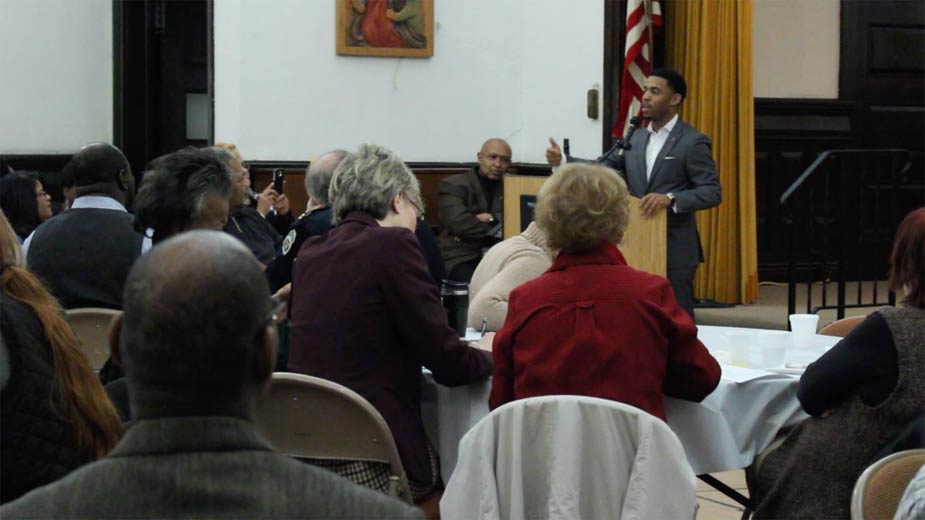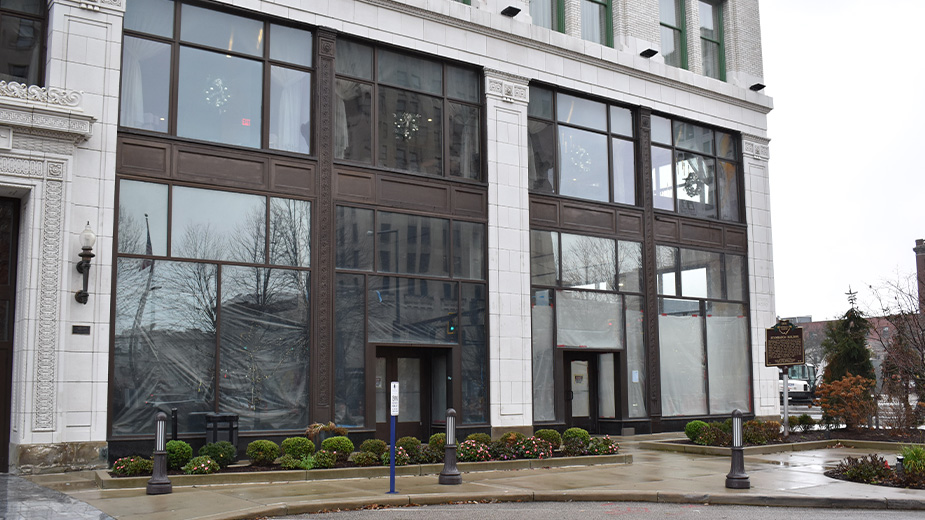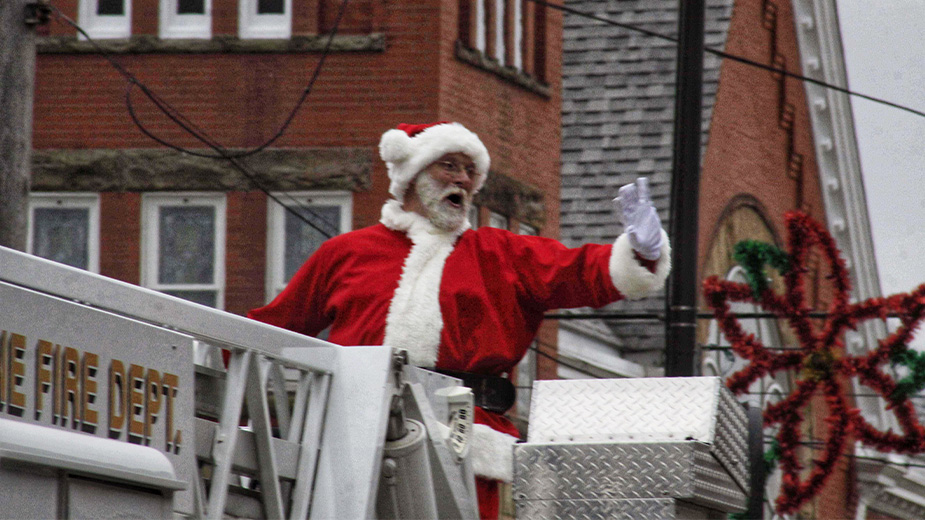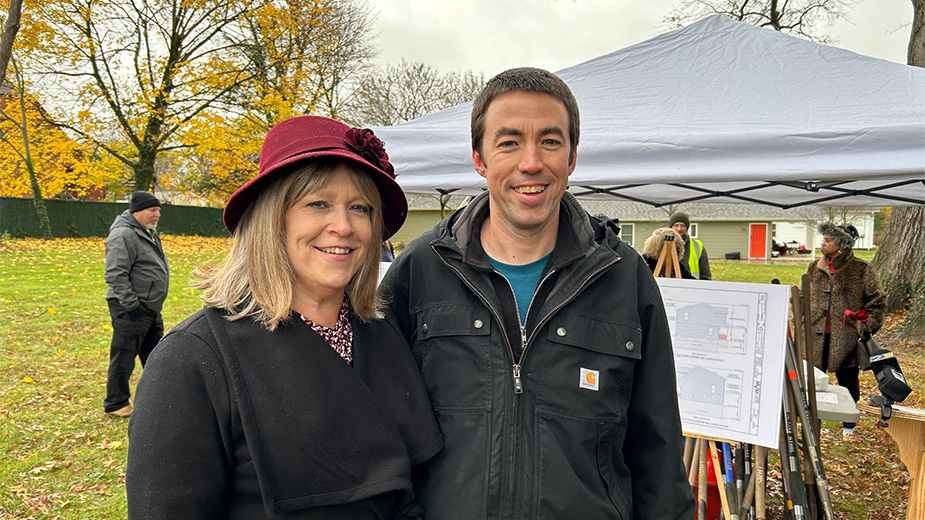MLK Day Workshop Looks at Institutional Racism
YOUNGSTOWN, Ohio – Addressing institutionalized racism in America requires whites and people of color conducting more than superficial conversations about the issue and for both to recognize their privilege, Minister DeVante Hudson said Monday.
Hudson delivered the keynote address at the morning-long program, Remembering What Is Civil and Doing What Is Right: An Examination of Institutionalized Racism.
The annual community workshop, held at First Presbyterian Church, concluded a two-day commemoration of the life and legacy of the Rev. Dr. Martin Luther King Jr. A worship service was held Sunday in Greater Friendship Baptist Church.
Some 75 people attended Monday’s workshop.
Hudson, a 2011 graduate of Liberty High School, attends the Candler School of Theology at Emory University in Atlanta and is a student ministries intern at New Mercies Christian Church, Lilburn, Ga.
“The issue of race is so deep in our country that for us to begin to dig our way out and have a healthy environment, we have to start by having healthy conversations and real dialogue about what we want to make different and what has been holding us back in our society for so long,” he said.
To have a conversation about racism requires that participants be able to acknowledge their own biases, he said. Privilege, he noted, isn’t exclusive to whites.
“We all function in a privilege,” he said. “I’m not just talking about white privilege. I’m talking about our black privilege, too.” Black privilege is the concept that someone who makes it out of an unfortunate environment such as a poor neighborhood doesn’t feel an obligation to reach back and help those he left.
“To have a healthy conversation about institutional racism,” he said, “we have to begin to reform what we think about ourselves and reflect on what it is we’re doing — to either hold back or create progress in our society when it comes to race.”
Institutional racism is social institutions structured such that they are biased against people of color.
“Some systems have been in place for so long I don’t know if people are aware of it,” said Jaladah Aslam, one of three co-conveners of Monday’s program.
Some retired police officers – black and white – acknowledge they were taught racial profiling “because there is this thought process in law enforcement that an African-American is automatically more dangerous than someone not of color,” she said.
One issue that afflicts minorities is the practice of police stopping motorists for “driving while black,” and Aslam offered her 20-year-old son as an example. A young, “big black man” who lives in a suburb, he has been stopped probably six or eight times without any tickets being issued, she said.
In his position as executive director of Youngstown’s human relations commission, Jonathan Bentley said he has dealt with institutionalized racism in several guises. He deals with it in housing, minority hiring and minority business programs for the city.
“Clients come to my office who have been steered to certain properties and not necessarily nicer units,” he said. Employment issues he encounters include wrongful termination and unfair treatment on the job. “As far as the minority business program, we deal a lot with discriminatory lending practices,” he said.
Bentley reported people have asked him for his view of President-elect Donald Trump nominating retired neurosurgeon Ben Carson to head the U.S. Department of Housing and Urban Development.
His preference, he said, would have been for Carson to be named to a post suited to his area of expertise, such as surgeon general.
“With him being the head of HUD, he is merely a figurehead there to repeal certain laws that restrict redlining and steering and unfavorable lending practices?” he asked. “What is his purpose for being placed in that position?”
Bentley called on people and institutions in the community to pool their resources to acquire vacated properties so they can be rehabilitated or torn down for greenspace. Such pooling would alleviate the stress on nonprofit organizations and outside programs.
Bentley was among several panelists to focus on four topics: criminal justice reform, education reform, entrepreneurship and youth concerns.
Omar Aslam – Jaladah Aslam’s son – noted that when he attended school in Austintown, there was no black studies program and the school did not observe Black History Month. He addressed youths’ concerns at the panel.
“The people that need to be at the table are not here,” remarked Pat Kerrigan, executive director of the Oak Hill Collaborative.
“You have to make people understand how these issues affect them,” said Shienne Williams of Youngstown, who moderated the panel discussion. Citing the low college graduation rates of minorities, she noted that trend results in rising tuition for everyone.
Delphine Baldwin-Casey, a retired sergeant with the Youngstown Police Department, recalled how her son came home from school and informed her that his school in Boardman was doing nothing for Black History Month. She recommended that he introduce something, which he and some friends did.
“Peeling back the layers, that’s what we have to do,” remarked state Senate Minority Leader Joe Schiavoni, D-33 Boardman. “It’s a little bit raw, a little bit uncomfortable, but that’s when you can actually make progress.”
Seventh District Court of Appeals Judge Mary DeGenaro said she was particularly impressed with the comments the youth panel expressed. Their “wise insights” regarding their wants and needs “give me a lot of hope for the city and the country,” she said.
Institutional racism needs to be acknowledged and the legal system is beginning to address it, DeGenaro said, including the encouragement of more diversity in the profession. That effort has to begin in grade school and continue with encouraging minority youths to graduate from high school, pursue college and law school should they choose, even run for office.
“The next thing that is very helpful is to try to cut away at institutional issues that, to a good extent, were well-intentioned but had unintended consequences,” she said, citing federal sentencing guidelines that limited discretion for trial judges.
The Rev. Kenneth Simon, another of the co-conveners, said he was pleased with the attendance and participation yesterday. Those attending – from officeholders and clergy to law enforcement and citizens — represented a cross-section of the community.
“It’s going to take all of us together because we can’t just sit around and talk about the problems. We have to work toward solutions,” he said. Follow-up meetings are planned to address the issues discussed and execute the goals set.
“We want to see changes in education, in criminal justice, in business entrepreneurship. We want to see some progress that we’ve made in those areas by next year,” he said.
Penny Wells, the third co-convener, is “looking forward to seeing what we can accomplish over the next year,” she said.
One program that emerged from last year’s workshop is preparing to become reality, she said. A few students who participated in Well’s Mahoning Valley Sojourn to the Past program suggested having college students work with students who are tardy or absent from Youngstown City Schools.
“It looks like that is going to come to fruition in the fall of 2017,” Wells said.
Watch Daily BUZZ Video:
‘The Fierce Urgency of Now
Copyright 2024 The Business Journal, Youngstown, Ohio.



